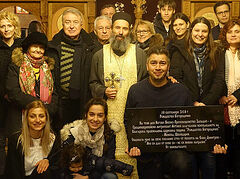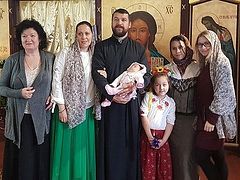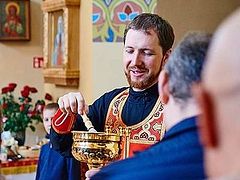A priest who is also a truck driver is not something you come across often. Fr. Alexander Yavorovsky combines the tough job of a truck driver for the Hödlmayr logistics company with his duties as rector of the Church of the Holy Apostle and Evangelist Mathew in the city of Leuven as one of the clergymen of the Archbishopric of Brussels and Belgium of the Russian Orthodox Church. Our engaging talk with Fr. Alexander covered topics as varied as how a broken jaw helped him become a priest, what it is like to be ordained at the age of just twenty-one, his truck driver training course and the relationship with other truckers, continuing his ministry while at the wheel of his rig, his multi-cultural parish, the Orthodox children’s camp in Belgium, why Europeans fear death, the deserted Catholic churches in Europe, government assistance and the gift of the priesthood.
 Archpriest Alexander Yavorovsky
Archpriest Alexander Yavorovsky
—Father Alexander, please tell us how and why you decided to become a priest.
—That’s both a tough and interesting question! It was so-called “unforeseen circumstances” that brought it about… When I was twelve, I had an unusual dream. I saw myself as a baby lifted high up into the clouds. I saw a huge table standing before me, with a great many crosses lying on top, all colored and sized differently. Then I heard a voice, “Well, what’s the matter? Pick one!” I picked a cross and then woke up. When I got up, I heard my grandmother asking me unexpectedly, “Sasha, do you want to go to church with me today?” I agreed. That’s how I went to church for the first time in my life. It was only later that I understood that this happened on the feast of the Transfiguration. From then on, I would often join my grandmother at church. I even attended the local Sunday school. Then I started serving as an altar boy, although I never thought of entering the seminary or becoming a priest.
I had my heart set on a different kind of work. I wanted to be… a criminal investigator! I was preparing for such a career when I finished school. Just before my entrance exams, which required a medical examination, I got into a fight and ended up with a broken jaw. There was no way I could pass the medical exam in that condition, but time was running short and I had to apply somewhere. The Minsk Theological Seminary was a mere 20 kilometers away from my hometown. I thought to myself—why not? It offers a real higher education, and the Church isn’t foreign to me… I decided to apply there, and planned to stay for a year and then, if I didn’t like it, apply to study somewhere else. I entered the seminary. That first year at the seminary completely transformed me and my frame of mind. I had a chance to study theology. I decided that this was the path I wanted to walk for the rest of my life.
I got married when I was in my third year of the seminary, and after that, despite my obvious young age (I was only nineteen), the ruling bishop ordained me a deacon. A year later, he told me, “That's enough living off your mother-in-law! Time to start serving,” and on October 10, 1999, I was ordained a priest. At just twenty-one years of age…
—You were so young!
—I was! I must say that it’s a terribly young age to become a priest. No one should be ordained at this tender age, because you simply don’t have a head on your shoulders yet. You don’t have any real experience, but people are already calling you “Father” and asking for advice… So, in retrospect, I must say I made a ton of mistakes as I handed out personal advice. Instead of helping, I did a real disservice to those who sought help from me. I regret it even today. Such early ordinations are no longer a thing now, as far as I know. Men need to be a bit older.
—I was utterly surprised when I found out about your job outside of being a priest… It is rare to meet a priest who works as a truck driver. This kind of work is tough, manly. It takes a lot of commitment and is physically demanding. Why did you become a truck driver?
—When I first arrived in Belgium, I received an assignment from my bishop to work in one of the parishes as an assistant priest. I found out that this parish was unable to cover my living expenses or offer financial compensation, unlike in Belarus where I had previously served. So, I had to find work, but where? I didn’t have any education other than my seminary degree. I realized I couldn’t do anything. A local system supporting people looking for a second education came to my aid. It is very well-organized and helps people like me who need to find a different profession.
But first I had to learn the language. Thanks to the great education I got at the seminary, I quickly learned Dutch, which is spoken in the part of Belgium where we were live. Next, I had to collect information about jobs that would pay enough to support a family. I had different options, but once I started asking around, I realized that the most cost-effective work was as a construction worker or a truck driver. I was told to forget about driving a truck, since I was a foreigner and needed to get serious training and that no one would hire me anyway. I decided to give it a try anyway.
At first, I applied for a truck driver-training course, passed the exam, and then studied at yet another driving school for another six months. I got my diploma and even an additional certificate allowing me to transport dangerous goods. Then I was hired by a local company. That’s how I became a rig driver. I like the Russian saying, “If you want to make God laugh, tell Him about your plans.” That’s what happened to me: I unexpectedly became a long-haul truck driver.
True, it is hard work. If someone in seminary had told me that I would be lugging a 65-foot-long behemoth weighing several tons around Europe, I never would have believed it! It is a lot of work. You are on the road somewhere between 12 to 15 hours a day. Plus, my current job duties involve sleeping in my truck on top of driving. That’s why, Monday through Friday, I literally live at work.
Why do I need to work so hard? The answer is simple: I’ve got a really big family by European standards. We have five kids aged six to twenty-one, and I invited my wife’s parents to live with us so that they could help her out with the kids.
—Where does your job take you, is it just Belgium or you get to travel internationally?
—It’s mainly the Benelux countries (Belgium, the Netherlands, and Luxembourg), as well as France and Germany. I travel about 600-700 kilometers a day.
—How do you manage to combine your work as a long-haul trucker with your ministry as a priest? Are you able to share the Word of God while at the wheel?
—A priest is always a priest, always and everywhere, whether he’s at church, at home, on vacation, out fishing or at his secular job. Here’s how I do it: from Monday through Friday, as I’ve already mentioned, I work and live in my truck. Then, from Friday evening through Sunday, I dedicate my time and energy to my parish. Whatever unfortunately small part is left, I dedicate to my family. I am on my mission even while driving! I get calls from my parishioners and I talk to them while on the road or answer their questions and offer advice during my evening stops. Sometimes someone has urgent needs while I am working, but I might be in their vicinity, so we get to meet in person and have a talk, or they pick me up and drive me home to minister to them, or to the hospital to visit a sick relative… That’s how I’m able to make it work.
—So if a major feast day falls on a weekday, does it mean you are unable to serve?
—Occasionally, I can. I try to take a day off on this day. I have 20 days of paid vacation per year. Out of those 20, I take five of them off for our annual parish trip to the monastery of St. John the Baptist in Maldon, Essex, in England. It was founded by Archimandrite Sophrony (Sakharov). Another five days I spend at the children’s summer camp, which continues on Saturday and Sunday, which I get off because it’s the weekend. Then, I take a few more days off during Passion Week and a day off on Bright Monday when we celebrate a general festive liturgy with our clergy and the ruling bishop. I also have five days off a year left to spend with my family—this is my personal vacation time…
—Does your employer know you are an Orthodox priest? What do your boss and coworkers and their bosses think?
—Yes, it was a bit of a shock when the management first found out. My co-workers were stunned, too. In their minds, a priest, or a “pastor,” as they are called here, is someone who always wears dark long clothing, is all smiles, but can only be found at church. In my case, they met one in completely unexpected circumstances.
They treat me well, with understanding. Some are surprised, and some tease me. But in general, they treat me with respect. The company I work for employs about 100 truckers. If a group of drivers are standing around the headquarters, once they see me coming, they start whispering amongst themselves, “Psst, cut the swearing and racy stuff, pastor is coming!” Some call me Alex (short for Alexander), while others just call me “pastor.” The ones who didn’t know I was a priest thought that it was my nickname. But as soon they find out, their surprise is quite obvious.
—I imagine a long-haul truck driver as someone who’s been around, has got some wisdom and is good at reading people. What have you learned from your job and what effect has it had on you?
—It has taught me that a priest, despite his ministry, needs to work. Work ennobles man, it teaches a Christian discipline and self-cultivation. It helps keep you within certain limits, especially if you haven’t learned what to do with your freedom. Work forces you to keep a certain rhythm.
It has taught me that I am to remain a priest always and everywhere. You simply cannot take off your ryassa, sit down at the wheel of your truck, and think: Now I'm just another trucker, so I don’t need to think about my ministry. No, it doesn’t work this way. I even call the rig “my cell on wheels.” It is not only where I work but also where I serve. I can even conduct certain services there. It is also an ideal place for prayer. The Lord has given me this job for a reason. I realized after a few years that I would have suffered had I worked at a busy place surrounded by many people. When you are around people, you have a different frame of mind. I am completely alone in my cabin. To me it seems to be an ideal job for a priest because you can spend time all by yourself.
My co-workers, long-haul truckers, waste their time listening to the radio and music or chatting over the phone or radio. They burn their days away like this. I can’t even imagine it. What do I do while driving? I’ve got a massive audio collection of audiobooks and lectures. I have the whole day laid out: the prayer rule first, then lectures, books, then prayer again, and time for contemplation. In the evenings, I typically have pre-arranged calls or meetings. If there are no calls, I have a couple of hours to have supper and rest before going to bed.
—Could you share some of the audiobooks in your collection?
—Apart from the Holy Scriptures, my spiritual playlist includes (though I also have them in print in my home library) St. Isaac the Syrian, Venerable Igumena Arsenia (Sebryakova), and Schema-Igumen John (Alexeev). Their books keep me afloat and I recommend them to anyone taking his first steps in Orthodoxy.
—Could you share a story from your life as a truck driver?
—I transport new cars and I often get to meet Russians at the docks. I often hear someone speaking my mother tongue, and end up witnessing how a person is in a tough situation but doesn’t know a word in the local language. So, I can come to their rescue. I tell them, “Let me help you since I know the language.” More often than not, I immediately hear these Russian guys ask, “Are you a priest?” I am surprised, I ask them what gave me away, since I don’t stand out: My beard is patchy, my hair is pulled back in a ponytail, but that’s all! They respond, “You speak differently.” I think it is because I don’t swear.
Now here is a story. A few months ago, I was on assignment unloading new cars in a small town and had to wait for a quality control inspection at the dealership. I was standing beside my truck, deep in thought, when suddenly, I hear, “Father Alexander, bless!” I turn around. I see a young man walking towards me, someone I have known for many years. I bless him and we kiss each other three times. We stand there talking. Soon, I realize that we are the center of everyone’s attention. Everyone around and inside the dealership is staring at us. They couldn’t grasp what it was all about: there was a truck driver, but then a guy walked up to him bowing down and kissing his hand… Is he some kind of a mafioso?
To be continued.





